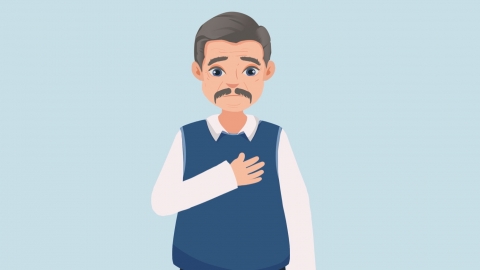What are the causes of palpitations and restlessness in elderly individuals?
Generally, restlessness and anxiety in elderly individuals may be caused by insufficient sleep, sudden environmental changes, coronary heart disease, hyperthyroidism, Parkinson's disease, or other factors. If discomfort occurs, it is recommended to seek timely medical evaluation and treatment at a正规 hospital. Detailed analysis is as follows:
1. Insufficient Sleep
Elderly people often experience shortened sleep cycles, frequent awakenings, and difficulty falling asleep, leading to brain fatigue and resulting in irritability and restlessness. Establishing consistent pre-sleep routines such as reading the newspaper, keeping the bedroom dim and quiet, and avoiding strong tea or coffee before bedtime can help improve sleep quality.

2. Sudden Environmental Changes
Life changes such as moving to a new residence or the loss of family and friends can disrupt daily routines. Due to reduced adaptability, elderly individuals are prone to feelings of unease. Maintaining familiar personal items, increasing family companionship and conversation, and gradually guiding them to become accustomed to new surroundings can help reduce anxiety.
3. Coronary Heart Disease
Inadequate blood supply in the coronary arteries leads to myocardial ischemia, causing chest tightness and discomfort, which in turn triggers psychological anxiety and restlessness. Symptoms often include chest pain and shortness of breath. Medications such as enteric-coated aspirin tablets, nitroglycerin tablets, and rosuvastatin calcium tablets may be used as prescribed. Strenuous activities should be avoided, and emotional stability maintained.
4. Hyperthyroidism
Excessive secretion of thyroid hormones accelerates metabolism, causing nervous system overexcitement, palpitations, and hand tremors, leading to restlessness. Medications such as methimazole tablets, propylthiouracil tablets, and propranolol tablets may be taken under medical supervision. Dietary intake of iodine-rich foods should be reduced.
5. Parkinson’s Disease
Reduced dopamine levels in the brain lead to limb tremors and muscle rigidity, causing physical discomfort and subsequent psychological agitation. Treatments may include levodopa-carbidopa (benserazide) tablets, pramipexole hydrochloride tablets, and entacapone tablets as directed by a physician. In severe cases, deep brain stimulation surgery may be considered. Daily care with family assistance is often required.
In daily life, it is important to ensure adequate sleep for elderly individuals; create a stable and familiar living environment; schedule regular health check-ups; and pay close attention to emotional changes, providing timely support and relief to minimize feelings of anxiety.




